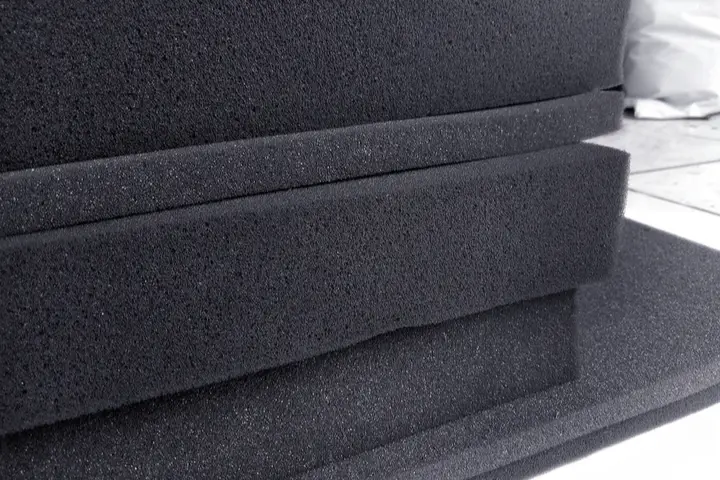In today’s modern word, concepts like the ‘Circular Economy’ and the growing trend or general move in society towards re-use and recycling of materials & products has irradiated the significance to recycle all types of glass. All glass not only includes the container glass such as jars & bottles, but also the glass that would otherwise end-up in landfill owing to the result of problems within the recycling process of glass such as color disparity, location, and feasible applications for all glass being collected.
Cellular glass or also known as foam glass is one such solution which was first developed by Saint-Gobain of France in the 1930s with calcium carbonate (CaCO3) as a foaming agent.
Request Exclusive Sample Report here @https://www.researchdive.com/download-sample/404
What is a Cellular Glass?
Cellular glass is a type of insulation and is manufactured through reaction between crushed glass and carbon at high temperature. As crushed glass is a large part of cellular glass’ composition, it retains some of the similar advantages of glass. There are numerous applications for cellular glass. This glass can be especially shaped for insulating objects such as tanks or pipes. Cellular glass is widely used to produce insulation panels for structures. Floatation devices and cold storage are other applications of cellular glass.
Cellular glass is manufactured and is not found naturally. Thus, glass is collected and then crushed down into a powder and carbon or limestone is added to the glass. This mixture is then baked at high temperatures. Lastly, the baked mixture is then heat-treated & shaped.
According to a report published by Research Dive, the global Cellular Glass Market is estimated to witness a lucrative growth during the forecast period from 2019 to 2027 owing to the growing demand for cellular glass in the building & construction application. The market is projected to grow at a CAGR of 5.4% over the forecast period.
Connect with our expert analyst to get more details@ https://www.researchdive.com/connect-to-analyst/404
The Future of Glass Recycling
Cellular glass is a versatile high-quality product that is made using post-consumer re-used or recycled glass as well as commercial, flat or end of life vehicles. Hence, there is no need to undertake the costly color separation in the ‘waste glass’ and the contaminants such as can also remain evident.
As cellular glass is made from refined glass and owing to its cellular sealed structure, it offers the following benefits:
- Excellent insulating capabilities
- Improves the growing of plants through hydroponics
- Classified as the best fire-resistant building material
- High compressive strength
- Waterproof as well as being vapor and gas tight
- Chemically inactive / inert
- Does not support life to grow and hence is resistant to mould, vermin, and pests
- Sound Absorbing
- Non-corrosive and long-lasting
- Easy to work, lightweight, and non-fibrous
- Environment friendly as it is made from 100% recycled glass
Due to these benefits cellular glass is a suitable & rigid insulation material in traffic areas, walls, roofs, and floors where other products may be trampled, which could result in an uneven surface and also the loss of insulating properties.
The need for extra layers of protection or insulation constructing are eliminated because cellular glass can provide all the needed functions and even offer benefits or improvements when compared to traditional materials. Thus, cellular glass is widely used in civil engineering projects, which also helps in saving time & money, especially owing to its lightweight nature.
As cellular glass is made entirely from 100% recycled glass, a glass processing plant or manufacturers such as the Krysteline Technologies and many others is a clear choice if looking to prepare a glass for the cellular glass market. The thermal cleansing and implosion technology of the glass processing plants assists in creating high-quality glass powder, which is suitable for use as a cellular glass feedstock.
The Bottom Line
There are also other types of processing glass available in the glass manufacturing industry such as the commercial flat glass, bottling line or pharmaceutical packaging, and end of life vehicles. Many of these types of glass are not frequently recycled because many stages are required for its separation as well as refinement from other contaminates. However, when efficiently refined, these type of glasses can be reused in the form of cellular glass. The use of glass that is not suitable for re-melt makes Cellular Glass an ideal associate to the traditional container glass industry.
Request for this Report Customization & Get a 10% Discount on this Report@ https://www.researchdive.com/request-for-customization/404
Related Reports:
Commercial Air Conditioning System (VRF) Market
About Us:
Research Dive is a market research firm based in Pune, India. Maintaining the integrity and authenticity of the services, the firm provides services that are solely based on its exclusive data model, compelled by the 360-degree research methodology, which guarantees comprehensive and accurate analysis. With unprecedented access to several paid data resources, a team of expert researchers, and a strict work ethic, the firm offers insights that are extremely precise and reliable. Scrutinizing relevant news releases, government publications, and decades of trade data, and technical white papers, Research dive delivers the required services to its clients well within the required timeframe. Its expertise is focused on examining niche markets, targeting their major driving factors, and spotting threatening hindrances. Complementarily, it also has a seamless collaboration with the major Market aficionado that further offers its research an edge.
Contact Us:
Mr. Abhishek Paliwal
Research Dive
30 Wall St. 8th Floor, New York
NY 10005 (P)
+ 91 (788) 802-9103 (India)
+1 (917) 444-1262 (US) Toll
Free: +1 -888-961-4454
Email: support@researchdive.com
LinkedIn: https://www.linkedin.com/company/research-dive
Twitter: https://twitter.com/ResearchDive
Facebook: https://www.facebook.com/Research-Dive
0






